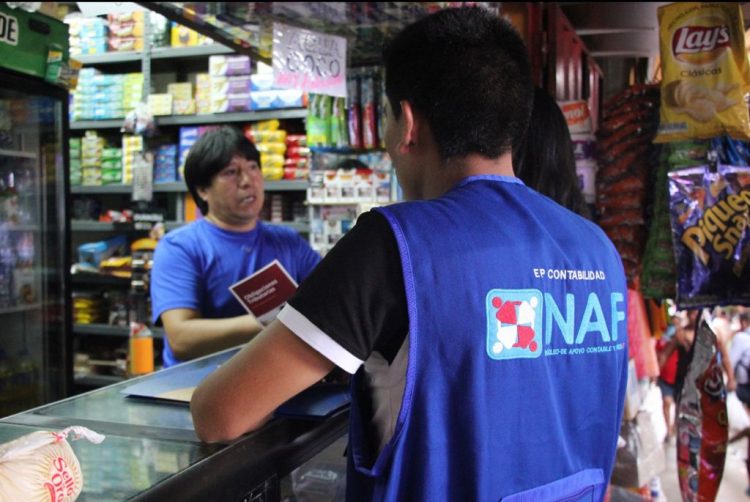By Borja Díaz Rivillas, Head of Good Governance in the EUROsociAL+ Democratic Governance Area

In today’s societies, weak civic commitment to paying taxes, lack of institutional transparency and misuse of public resources often limit the scope of policies for social cohesion. To overcome these obstacles, it is essential that administrations receive support from citizens. It is not enough to monitor and sanction, people need to receive a lot of information and training to facilitate voluntary compliance with their tax obligations. From the field of tax education, precise knowledge is provided to understand the workings of the state and what the relevance is of taxes and public spending in relation to the collective welfare of citizens. The university is a privileged space when it comes to imparting these lessons.
In this sense, the Accounting and Tax Support Centres, known as NAF, constitute a bridge between the Tax Administration and Latin American citizens, especially those with fewer resources. The NAFs are advisory points in which Accounting and Business Sciences degree students, trained by the Tax Administration, provide free accounting and tax assistance to low-income people and micro-entrepreneurs, at the same time that they themselves improve their professional skills and their ethical attitudes, serving as a link between two still very distant worlds.
The initiative has clear benefits for all participants. The community benefits from help in solving basic tax issues, while the Tax Administration fulfils its civic education role and provides support to the most disadvantaged. The university, for its part, strengthens its ties with the community and provides its students with up-to-date knowledge on tax matters and professional ethics, free of charge, also reinforcing its university outreach and social responsibility activities.
Citizens who come to NAF points find a friendly environment, where students spend time with them, speak to them in understandable terms, listen to their problems and teach them to use computer tools, thus contributing to reducing the digital divide. Since their companies are mainly family managed concerns, in many cases they lack accounting control, which limits the effectiveness of the businesses. Others go to the NAF points because they do not have the means to hire a tax advisor, they are unaware of tax issues or are afraid of the tax authority.
NAFs were originally designed by the Federal Revenue in Brazil, a country where they operate in more than 300 universities. Since 2014, EUROsociAL, together with this institution, has promoted the advancement of NAFs in Latin America through the exchange of experiences between peer tax administrations and universities from different countries. The tools have been diverse: workshops, specialised consultancies, manuals and studies to identify best practices and adopt innovative solutions. All such actions have been guided by participatory dialogue between officials in the tax administrations, teachers, university officials and students, with the aim of socialising the idea of the NAF and agreeing on the steps forward regarding its national adaptation by the actors involved.
As shown by the study “NAFs as a Lever for Social Inclusion”, prepared by Antonio Rodríguez-Carmona, NAFs are a phenomenon which is expanding, both qualitatively and quantitatively, due to the expansion of the services provided, the growing attention given to vulnerable groups, the launch of new channels to overcome access barriers and the revitalisation of tax education schemes. They are now present in 671 universities in 12 countries and, in 2019 alone, they dealt with 247,054 citizen enquiries. In this phase of EUROsociAL+, NAFs have been created in Peru, Paraguay, Honduras, Argentina and Colombia (especially in post-conflict affected areas) and inputs have been generated for their optimisation in seven other countries, with emphasis put on inclusive taxation and on vulnerable groups.
The initiative has received various awards. In 2016, the National Planning Department (DNP) of Colombia awarded the Directorate of National Taxes and Customs (DIAN) one of the awards for Innovation in Citizen Service Best Practice for its work with NAFs. That same year, the State University of Paraíba NAF won the National Tax Education Award in Brazil. In 2018, Peru’s NAFs were recognised for their best practice in public management by the NGO Ciudadanos al Día as an example of efficiency, commitment and citizen service. Likewise, NAFs were included in the OECD publication,What drives people and businesses to pay tax? (2019), as one of the most innovative educational actions aimed at improving attitudes towards tax.
The initiative was built within Latin America, demonstrating the potential of South-South or triangular cooperation. There is no standard model, but rather a model that each country, each university and each tax administration adapts to the reality which affects them, offering the services they consider appropriate. We cannot forget that NAFs comprise a young initiative and a true laboratory for social innovation. They are adapting to new realities such as digitisation, the challenges of the COVID-19 pandemic, social vulnerabilities in relation to paying taxes or the challenge of effectively reaching the community with a differentiated approach, fulfilling a social role.
In “The Potential of NAFs as a Lever for Social Inclusion”, Antonio Rodríguez-Carmona reflects, together with the institutions that comprise the Latin American NAF Network, on these scenarios, opening up new pathways by collecting innovative experiences from various countries where NAFs have had an impact on improving the lives of the population. Without forgetting the educational and free nature of the service provided by the students, the analysis shows that NAFs have enormous potential to become more actively involved in public policies regarding fiscal inclusion in the countries in the region and, in this way, act as a catalyst for the 2030 Agenda. This publication is an important step in that direction.



